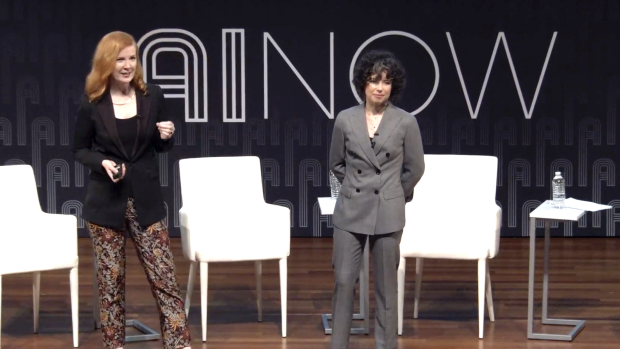AI Now symposium sends up a warning on harmful AI

Kate Crawford and Meredith Whittaker, the co-founders of the AI Now Institute, at the fourth annual AI Symposium
Kate Crawford and Meredith Whittaker, the co-founders of the AI Now Institute, one of NYU Tandon’s 10 academic research centers devoted to areas of world-changing importance, often point out that AI-based tools like facial-recognition software display the same biases as humans, but with the dangerous and misleading appearance of technical neutrality. “These tools are dangerous when they fail and harmful when they work,” Crawford recently wrote in an issue of Nature.
In early October, the Institute hosted its fourth annual symposium, which drew hundreds of attendees to the Skirball Center on Washington Square. The event focused on the growing pushback to harmful forms of AI, examining its use in policing and border control, landlord-tenant interactions, and the workplace, among other areas.
As the organizers and panelists made clear, the problems raised by AI are social, cultural, and political — rather than merely technical. And despite the rapidly increasing use of AI in many spheres, it’s imperative to step back and decide just what types of AI are acceptable to us as citizens and how much we should actually be relying on technologies whose social costs have not yet been fully discerned. “It’s naïve to think that such a powerful and useful technology can be limited,” attorney Jennifer Lord, one of the panelists, asserted. “Our challenge is to better understand how AI systems are being employed — and to ensure they are made safe and accountable for use with human beings.”
“The AI Now Symposium illustrated the great insights generated by the research led by the AI Now team,” Anne-Laure Fayard, an associate professor in Tandon’s Department of Technology Management and Innovation and Department of Technology, Culture and Society, said. “It also showed how they have become the catalyst for conversations and actions aiming to address the consequences — intended and unintended — of our increasing reliance on algorithms and machine learning.”
Despite the bleak future that could result if misuse of AI is allowed to go unchecked, the symposium’s speakers left the audience with a feeling of optimism.
Jonathan Soffer, Chair of the Department of Technology, Culture and Society and Interim Chair of the Department of Technology Management and Innovation, echoed the sentiments of many, asserting: “The AI Now event showed how hard activists are working to protect workers from new technological methods of exploitation and unfair appropriate of data under duress, as with landlords’ collection of biometric data as a condition of allowing people into their own homes. It was exhilarating to find out how much good work is being done.”

